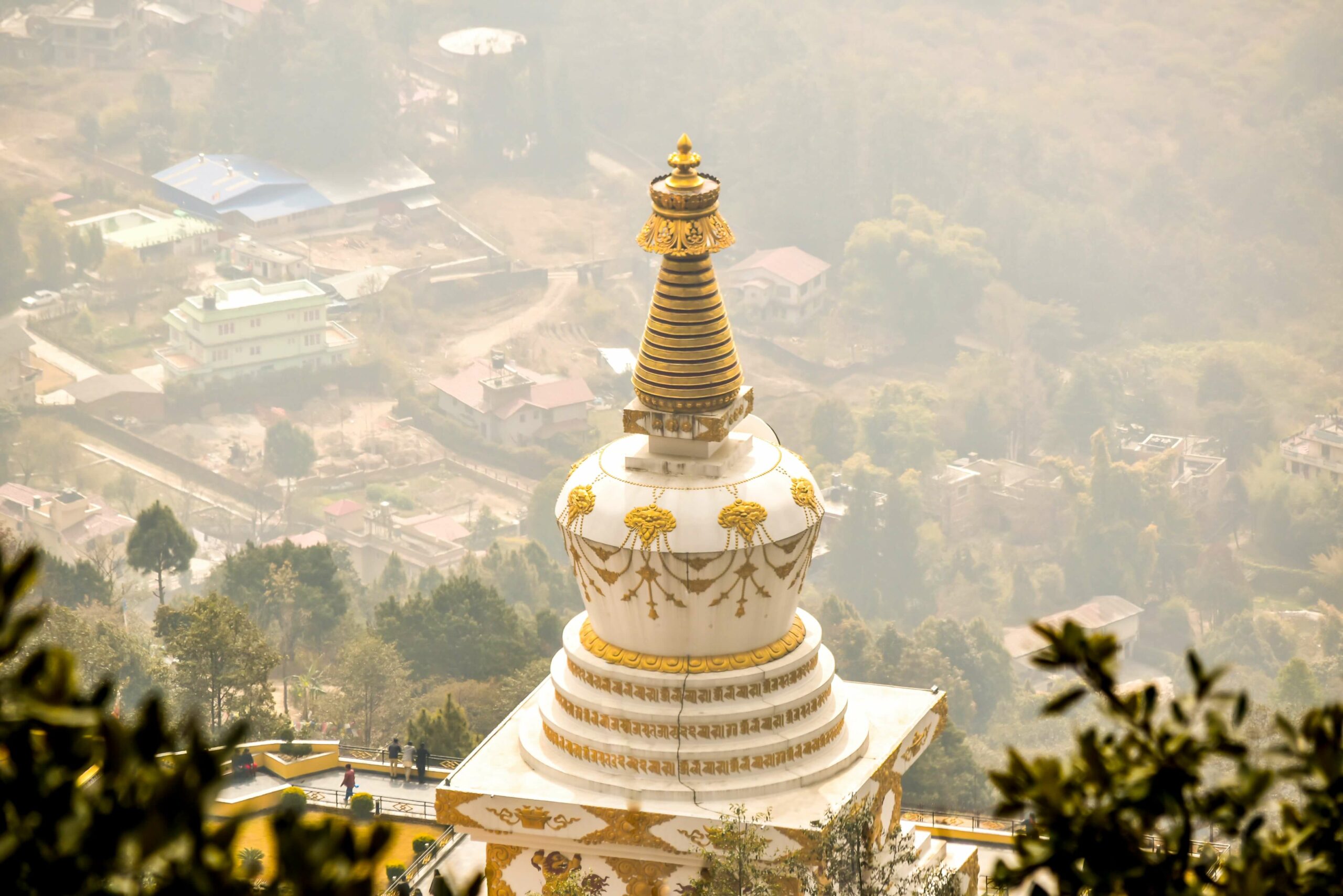Have you ever wondered what happens in a Buddhist wedding ceremony? Or are you planning one of your own?
We all get curious to understand a new tradition. Not to worry, though; we’ve got you covered!
There are many fascinating rituals and traditions in Buddhism. If you have visited parts of India or Asia, you will most likely hear about these traditions and rituals.
Buddhist wedding traditions usually honor Siddhartha Gautama’s teachings and are worshiped to offer blessings to the couple.
The wedding takes place to portray the couple’s devoutness to the faith. Buddhists consider a wedding ceremony a secular issue; it is one’s choice to get married and not a mandatory sacrament.
Below are some of the common traditions and rituals for Buddhist weddings.
10 Buddhist Wedding Traditions and Rituals
1. Decorations
What is a lovely wedding without decorations? The fascinating Buddhist wedding ceremony combines different aspects of decor to bring out different Buddhist symbols and cultures. Here’s what you need to know concerning decorations in a Buddhist wedding:
The main focal point, usually a centerpiece, incorporates a vast Buddha statue, gold in color. To surround this statue, other decorations such as flowers, bells, and candles also make an attractive sight. The Buddhist wedding traditions also use incense to surround the Buddha statue, considered a cultural symbol of unity.
The other important aspect is Tibetan Buddhists’ rainbow prayer flags during the ceremony. These brightly colored cloths are held as a prayer to guide the couple and family members on their way. The prayer flags represent the wishes of good health, a long and happy life, wealth, success, and wisdom.
The other decorations you might need to be aware of are the different flowers used, like the lotus flower symbolizing purity.
2. The Couple’s Vows
Vows are essential to a wedding as they signify the couple’s commitment to each other. In a Buddhist wedding ceremony, the couple will position themselves before a Buddha image and recite vows representing their love for each other.
The vows reflect a longing for happiness, wisdom, and compassion. As Buddhism emphasizes wisdom, the couple must vow to be compassionate and always listen to each other. This way, they can learn to make the right decisions for their lives and their family.
3. The Couple’s Attire
When it comes to a Buddhist wedding ceremony, the couple’s attire is also an essential part. Although Buddhists do not have a specific dress code to follow, some traditions and rituals are observed to maintain the tradition of the Buddhist wedding.
The bride usually adorns herself with a beautiful dress called Bhaku, made using brocade fabric. On top, she wears a Hanju, a long-sleeved blouse incorporating Chinese silk to bring out its lovely draping style. She then wears a scarf and a unique jacket to complement the look.
Buddhists do not follow a particular color code for the bride’s dress. However, they discourage using black, considered an unlucky color in the culture.
When it comes to jewelry, the bride wears unique stones like turquoise and pearls on the forehead and neck as ornamentation.
As for the groom, he also adorns himself with a Bhaku. However, for this case, the length of the Bhaku is usually shorter, precisely above the ankles. The groom then wears a waistcoat and a sash on the waist.
Besides traditional attire, there are other ways to dress up for the wedding. You can find many other options in different Asian regions packed with all the modern accessories you need to look good on your wedding day.
4. The Wedding Coordinator
Who will organize the wedding? The wedding organizer, or the master of ceremonies, is in charge of the whole ceremony. This person is often a monk or spiritual advisor to ensure that the Buddhist traditions are followed well. However, it is essential to note that it is not compulsory to have the monk or nun facilitate the whole ceremony.
Most individuals look for a civil celebrant to conduct their wedding and then incorporate blessings through the monks. This person is a legal member of the public authority and can officiate civil ceremonies for all religious and secular matters. They should be well conversant with Buddhist traditions to be effective wedding coordinators.
The event coordinator will be responsible for leading the couple through all necessary rituals and ensuring that they have everything they need to make the wedding a success—for instance, providing incense sticks or candles for the pair to light for their ancestors and other rituals.
5. Readings and Meditations in The Ceremony
A Buddhist wedding ceremony will contain readings and meditations which help guests engage in more profound aspects of Buddhism. These readings and meditations often bring in the profound teachings of Buddhism to the bride and groom, who may not have access to a teacher or a class. The readings also emphasize the meaning of marriage and how to carry it out.
During the ceremony, one individual will read specific passages by respected Buddhist teachers like Dōgen and Tibet’s Dalai Lama, who often deliver the messages to the couple during ceremonies.
The readings and meditations in a Buddhist wedding ceremony will also tap into the couple’s wisdom to create positive messages in their marriage vows.
6. Special Offering to Buddha
After the readings and meditations, it is also customary to offer an offering to Buddha as a thanksgiving for blessing the marriage union. There are different types of offerings depending on the family’s religious beliefs. Most couples will do the following:
- The couple can present a unique offering to Buddha by lighting incense and making prayers.
- The bride and groom can give generous gifts like flowers to Buddha.
- They can also go to the temple and hold special rituals to show gratitude.
After giving their offerings to Buddha, the couple will reflect silently with their palms placed in front of their hearts. This way, they can focus on the essence of Buddha and practice silent meditation.
7. The Monks’ Blessings
Monks and nuns are a special part of a Buddhist wedding. Couples will usually invite them to their wedding ceremonies to offer blessings, as they are highly regarded in Buddhism. Hence, the monks will bestow blessings and wisdom to the bride and groom and their families.
If you do not manage to invite the monks, you can as well visit the temple and ask them to offer some blessings. The monks will bless you and your family when you are married in a Buddhist wedding ceremony.
When receiving the blessings, the couple will sit in front of the monks. They will then place their palms on their hearts in respect. The monks then utter words to bless the couple and their new marriage.
8. The Rituals of Togetherness
Another critical aspect of a Buddhist wedding ceremony is the Rituals of Togetherness. This part of the wedding ceremony signifies the couple’s union as husband and wife. Again, things here happen differently according to the different cultures and traditions.
Some individuals will exchange wedding rings, symbolic of their commitment to the relationship. This is common, especially in Western traditions.
Other traditions require couples to use water to fill a silver bowl together. They also do this to signify their togetherness and commitment to marriage.
When you visit Asian countries in the Southeast, believers here use a red string for the rituals of togetherness. They tie this string on the couple’s wrists to signify their togetherness. It also represents the union of the bride and groom for a lifetime.
The Rituals of Togetherness are essential to a Buddhist wedding because they signify the couple’s commitment to each other. They also represent the unity of both families and their journey together as a couple and family.
9. A Feast for The Newlyweds!
The wedding feast is one of the most important rituals in a Buddhist wedding. It is a festive occasion where guests are encouraged to share food and drinks with the newlyweds. This celebration often brings together many people from different cultures and traditions.
As for the cuisine, it can vary depending on the region and culture. Most of the time, it has Chinese, Japanese, Indian, and Thai origins. The food here is mainly plated as they minimally use the buffet style. The banquet will also include a vegetarian meal for individuals who do not consume meat.
Another vital thing to remember is that the dinner may not incorporate a cake but will have other sweets that guests will take as dessert.
10. Music and Entertainment
Music and entertainment are essential in a Buddhist wedding ceremony. Couples often incorporate music in their wedding ceremony to create a celebratory atmosphere. They can have live bands or DJs, who will play songs that are in line with the occasion, and most importantly, they should be religious-themed.
You can also have entertainment that will directly relate to Buddhist teachings. For instance, you can invite a storyteller and ask him to narrate a short story about Buddha. This will be a great way to share Buddhist teachings in the ceremony.
In addition, you can incorporate speeches, karaoke, or games into the celebration to keep everyone engaged.



